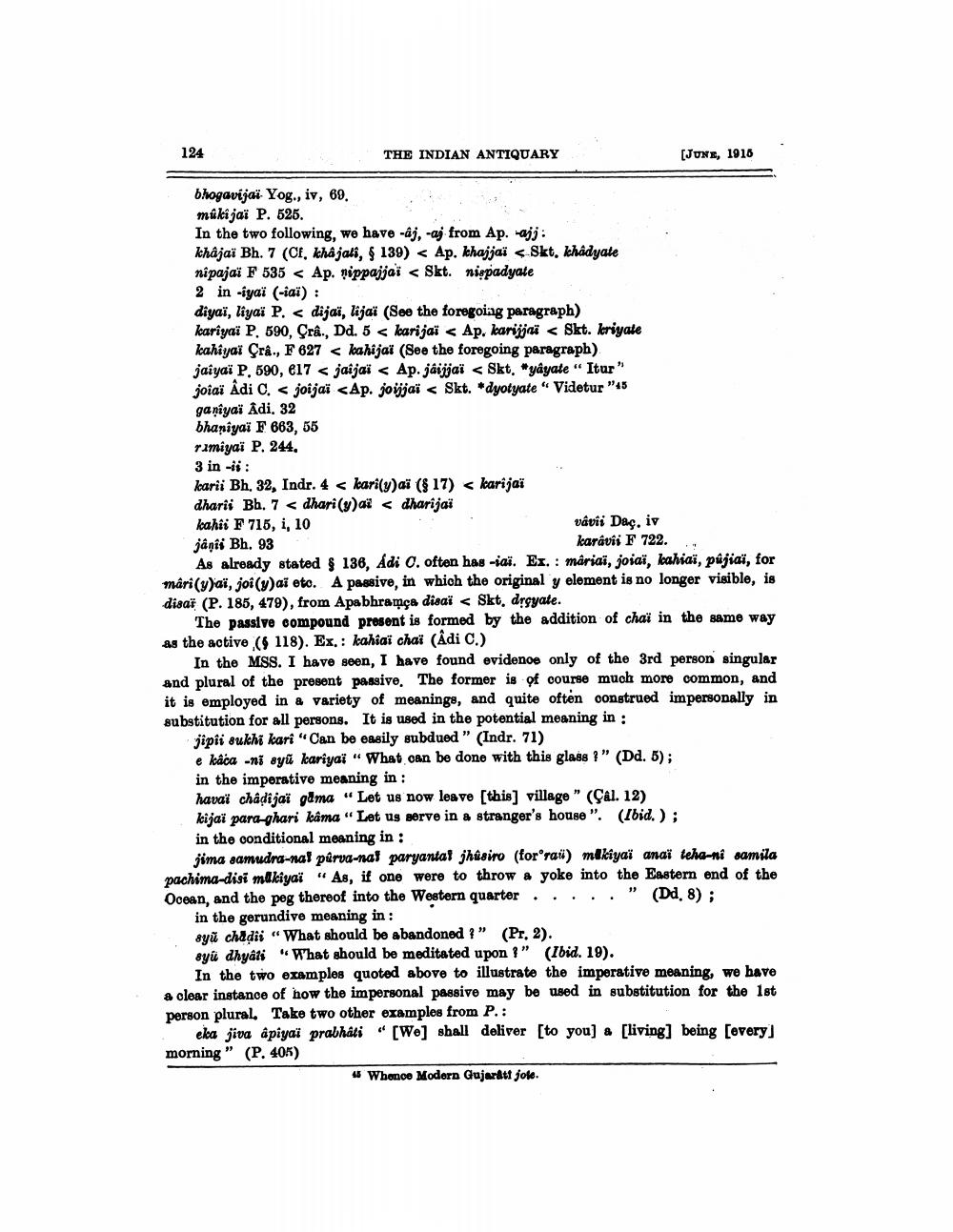________________
124
THE INDIAN ANTIQUARY
[JUNE, 1916
bhogavijai Yog., iv, 69. múkijaż P. 525. In the two following, we have -aj, -aj from Ap. ajj : khâjai Bh. 7 (CF, khajali, $ 139) < Ap. Ihajjač < Skt, khádyale nipajai F 535 < Ap. nippajjai < Skt. nispadyate 2 in -iyai (-iai): diyai, liyai P. < dijai, lijai (See the foregoing paragraph) kariyai P. 590, Srâ., Dd. 5 < karijai < Ap, karijjni < Skt. Kriyale kahiyai Sra., F 627 < kahijai (See the foregoing paragraph) jaiyai P. 590, e17 < jaijai < Ap. jaijjai < Skt. *yâyate " Itur" joiai Âdi C. < joijai <Ap. joijjač < Skt. *dyotyate" Videtur "45 ganiyai Adi. 32 bhaniyai F 663, 55 ramiyai P. 244, 3 in ii : karii Bh. 32, Indr. 4 < kari(y)aï (817) < karijai dharii Bh. 7 < dhari(y)ai < dharijai kahii F 715, i, 10
vavii Dac. iv jaşii Bh. 93
karavij F 722. As already stated § 136, Adi O. often has -iai. Ex.: mariai, joiai, lahiai, púgiai, for mari(y)ai, joi(y)ai eto. A passive, in which the original y element is no longer visible, is disaf (P. 185, 479), from Apa bhramça disaï < Skt, drgyate.
The passive compound prosent is formed by the addition of chai in the same way as the active (4 118). Ex.: kahiai chai (Âdi C.)
In the MSS. I have seen, I have found evidenoe only of the 3rd person singular and plural of the present passive. The former is of course much more common, and it is employed in a variety of meanings, and quite often construed impersonally in substitution for all persons. It is used in the potential meaning in :
jipii sukhi kari "Can be easily subdued " (Indr. 71) e kaca -ni syű kariyai " What can be done with this glass?" (Dd. 5); in the imperative meaning in : havai chadijai gama “Let us now leave [this] village" (Çal. 12) Icijai para-ghari kama "Let us serve in a stranger's house". (Ibid.) ; in the conditional meaning in :
jima samudra-nal pûrva-nal paryantal jhísiro (fororail) makiyai anai teha-ni samila pachima-disi makiyai “ As, if one were to throw a yoke into the Eastern end of the Ocean, and the peg thereof into the Western quarter ....." (Dd. 8);
in the gerundive meaning in : syū chadii “What should be abandoned ?" (Pr. 2). syu dhyati "What should be meditated upon ?" (Ibid. 19).
In the two examples quoted above to illustrate the imperative meaning, we have a clear instance of how the impersonal passive may be used in substitution for the 1st person plural. Take two other examples from P.:
eka jiva apiyai prabháti "(Wo] shall deliver [to you] a [living] being [every) morning" (P. 405)
45 Whonos Modern Gujarati jote.




